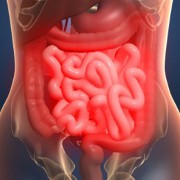 Photo: Getty Images
Photo: Getty Images
You may be surprised to hear that you have a second brain. It is your enteric nervous system, which is found in the attractive environs of your gut.
It's totally understandable if this doesn't sound particularly brain-like to you. But that's because you haven't yet heard that within your alimentary canal (beginning at the esophagus, and ending at, well, at the end) reside the same types of neurotransmitters and neurons that dwell in the brain and spinal cord of your central nervous system.
So said the health.harvard.edu website, which also assured us that the enteric nervous system uses its neurotransmitters and neurons to communicate with the central nervous system on a regular basis.
In fact, according to scientificamerican.com, the enteric nervous system is the proud owner of more neurons than you'll find in the spinal cord or in the peripheral nervous system. And something like 90 percent of fibers in the vagus nerve are busy carrying messages from the GI tract to the brain.
This information was most unexpected. But perhaps it should not be that surprising when you consider the fact that 95 percent of your serotonin is "down there".
This serotonin that is milling about in the neighborhood of the enteric nervous system appears to contribute to some types of diseases.
The February 7, 2010 Nature Medicine study indicated that the gut is involved with bone mass and the risk of osteoporosis. Autism may be partly explained by action of serotonin in the gut. Irritable bowel syndrome (IBS) brings suffering to over two million Americans and uses an excess of serotonin to do it.
Sciencedaily.com reported in an August 6, 2009 article that a quarter of adults in the U.S. are challenged by an assortment of GI disorders, from mild unpleasant symptoms to crippling pain and gastric distress that necessitates time off from work, and bowing out of family and social life.
Irritable bowel syndrome may hamper 10 percent of the nation, as estimated in a Eurekalert! public release from August 19, 2010.
As odd as it may sound, this very physical malady has often been considered to be psychosomatic. Apparently that is about to change.
The IBS segment of the population will feel vindicated to learn that research from the Technische Universitaet Muenchen seems to have found a cause for all the agony.
Tiny inflammations in the gut's mucosa set the enteric nervous system on its ear. Mediators from mast cells and enterochromaffin cells have a direct and profound effect on the bowel's nerve cells.
Consequently the gut's mucosa releases too much histamine, protease and serotonin for comfort. The mucosa's conversation with the enteric nervous system takes a turn for the worst.
Hopefully future research will uncover more about the enteric nervous system and lead to treatments to relieve the pain that is hatched by our second brain.
Resources:
Adult Gut Can Generate New Neurons
http://www.sciencedaily.com/releases/2009/08/090804174727.htm
Fix My Gut
http://www.fixmygut.com/in-the-news-children-and-functional-abdominal-pain
Think Twice: How the Gut's "Second Brain" Influences Mood and Well-Being
http://www.scientificamerican.com/article.cfm?id=gut-second-brain
Proof that a gut-wrenching complaint -- irritable bowel syndrome -- is not in your head
http://www.eurekalert.org/pub_releases/2010-08/tum-pta081910.php
Stress and the sensitive gut
http://www.health.harvard.edu/newsletters/Harvard_Mental_Health_Letter/2010/August/stress-and-the-sensitive-gut?utm_source=mental&utm_medium=pressrelease&utm_campaign=mental0810
Reviewed June 9, 2011
Edited by Alison Stanton
Visit Jody's website and blog at http://www.ncubator.ca and http://ncubator.ca/blogger





Add a CommentComments
There are no comments yet. Be the first one and get the conversation started!